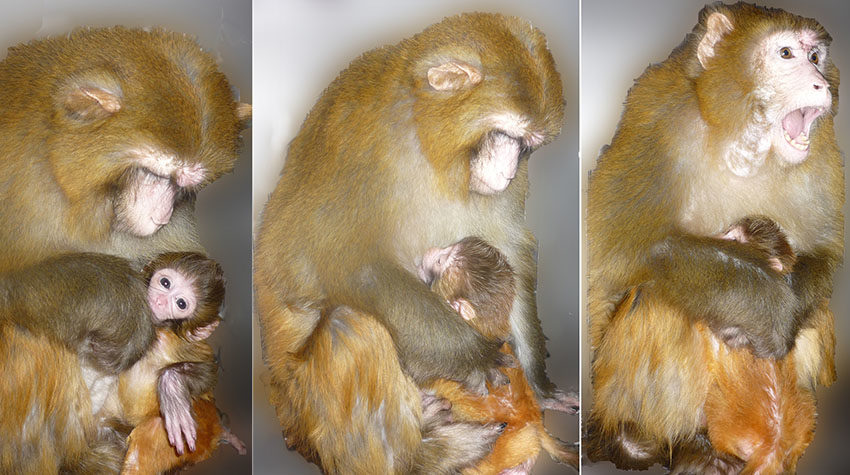
November 10, 2022Animal Law & Policy ClinicCruel Experiments on Monkeys Should Stop at Harvard Medical School
Harvard Law School’s Animal Law & Policy Clinic exists to provide students with direct experience in legal advocacy to advance the interests of animals, including non-human primates used in research. We were extremely disturbed to learn about cruel, invasive experiments being conducted on rhesus macaques by a Harvard Medical School laboratory. These experiments have been approved by the medical school, funded with taxpayer money by the National Institutes of Health (NIH), and published in notable journals such as the Proceedings of the National Academies of Sciences (PNAS).
An article published by PNAS in September describes the distress of five mother macaques deprived of their newborn infants in a Harvard Medical School lab run by Dr. Margaret S. Livingstone. According to the article, each mother macaque was taken from her social group and held alone for the duration of her pregnancy. Soon after each mother gave birth, researchers anesthetized her, took her infant from her, and left her with a stuffed toy. The researchers then tried to determine whether providing the mothers with this form of surrogate comfort could ease their distress at losing their infants.
Even more troubling, the infants were taken from their mothers to be used in other experiments conducted in the lab. A 2020 study describes subjecting baby monkeys to “abnormal visual experiences of faces.” The stated purpose of this research was to determine whether such deprivation adversely affects infant primates’ visual and brain development. The research was achieved not only by depriving the infants of their ability to see their mothers, but also by having laboratory staff wear “welders’ masks that prevented monkeys from seeing the human staff member’s face,” or raising monkeys “under conditions of binocular-visual-form deprivation via eye lid suturing for the first year.” In other words, researchers sewed shut the eyes of baby monkeys, or otherwise prevented them from seeing another primate’s face for a full 12 months. Researchers then implanted electrode arrays into the baby macaques brains to study their reactions to seeing faces and other images for the first time. Given this extreme visual deprivation, it seems obvious that this would have adverse impacts on both visual and brain development in such young primates.
In our opinion, experiments such as these raise profound ethical concerns, are cruel, and are unlikely to produce any meaningful benefit to humans that justifies inflicting such substantial suffering on these primates. The public also has been rightfully horrified to find out that such research is being conducted at Harvard Medical School. People for the Ethical Treatment of Animals first raised the alarm, and last month, more than 250 primatologists, behavioral researchers, and other scientists from around the world sent a letter calling on PNAS to retract Dr. Livingstone’s maternal deprivation article on the grounds that “the time for this unethical treatment of nonhuman animals for research is over.” As the scientists further explained in their letter, there simply is no need for such cruel research:
We have decades of research on the importance of the mother-infant bond (Hrdy, 1999), including work highlighting its particular importance in primates (Broad et al., 2006). . . . Clearly, we have evidence of the importance of maternal bonding for mothers and offspring. Experiments like this one do not add any meaningful contribution to our knowledge of primate or human behavior.
Given that we already know macaques are caring mothers who hold their infants close, and social beings who help one other in times of trouble, experiments such as these are grossly outdated and must come to an end.
Our Clinic currently is challenging the failure of the U.S. Department of Agriculture (USDA) to adopt standards requiring research facilities to house primates in conditions that are appropriate to each species’ natural behaviors and habitats.
We will continue to advocate for the elimination of all unnecessary research on animals, and for the safety and well-being of the thousands of non-human primates who still are used in labs across this country. We accordingly have called on Harvard Medical School’s Institutional Animal Care and Use Committee to review these protocols with the aim of ending these unnecessary experiments in keeping with the School’s mission to alleviate suffering and improve health and well-being. We also are exploring options to prevent such research from being funded and conducted in the future. As the primate and behavioral researchers succinctly explained in their letter to PNAS:
We cannot ask monkeys for consent, but we can stop using, publishing, and in this case actively promoting cruel methods that knowingly cause extreme distress. “Doing science to promote welfare becomes a moral obligation. It is what we owe the animals who live with us, given our autonomy violations in the past.” (Andrews 2020).
Image attribution: “Fig. 1, Margaret S. Livingstone, Triggers for Mother Love, 119 PNAS (2022), CC BY-NC-ND.”
